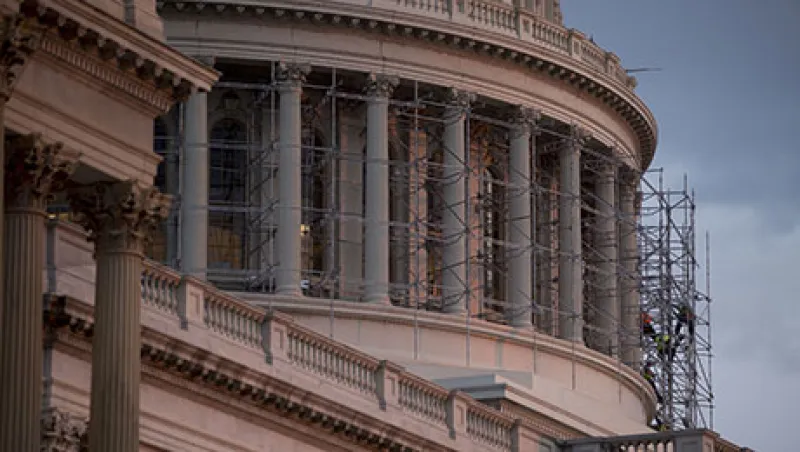Tax inversions have a powerful foe in Washington. In late September U.S. Treasury secretary Jack Lew handed down a set of rules targeting inversions, whereby a company merges with a partner in a jurisdiction offering lower corporate taxes and sets up headquarters there.
But when it comes to tax policy, these regulations carry more political than financial clout. In the lead-up to November’s midterm elections, inversions are a handy rallying point for both Democrats and Republicans.
Still, the new regime has already claimed its first victim. On October 3 Salix Pharmaceuticals of Raleigh, North Carolina, announced that it was abandoning its proposed merger with Cosmo Technologies, the Irish subsidiary of Italy’s Cosmo Pharmaceuticals. Salix, which would have acquired 20 percent of the combined Dublin-based company, cited a “changed political environment” as one reason. Now that the merger is dead, Salix must pay Cosmo a $25 million kill fee.
That same day U.S. medical device maker Medtronic went on the defensive, saying it had no plans to scuttle a planned $42.9 billion inversion tie-up with Irish counterpart Covidien, though Minnesota-headquartered Medtronic conceded that the merger would be tougher to finance under the new rules.
The Medtronic-Covidien deal stipulates that if either party walks away in the absence of new U.S. anti-inversion regulations from Congress, rather than the executive branch, it is on the hook for a similar breakup fee. (In connection with its planned inversion, Medtronic has already dished out $63 million to buffer its CEO and other senior management from excise taxes associated with the deal; these so-called tax gross-up fees pass taxes associated with executive compensation on to shareholders.)
At first blush it looks as if Lew’s edicts, which took effect immediately and apply to any unfinished deals, put the squeeze on U.S. companies seeking to domicile abroad, a move that he and President Barack Obama have called “unpatriotic.” In his September 22 statement Lew said the new rules are aimed at “meaningfully reducing the economic benefits of inversion,” if not outright dissuading companies from changing their tax location.
The rules prevent a U.S. corporation inverting into a foreign entity from owning more than 79 percent of the new company. They also forbid using what are known as hopscotch loans to tap an overseas subsidiary while deferring domestic earnings, ban the restructuring of foreign subsidiaries to access tax-free funds and clamp down on avoiding U.S. taxes by shifting earnings to a controlled foreign corporation.
If Salix’s decision is any sign, companies are now thinking twice about inversions. But deals such as Medtronic-Covidien and the proposed $11.5 billion merger of U.S. fast-food giant Burger King and Canadian coffee and doughnut chain Tim Hortons appear to be proceeding. Washington’s gambit has left some observers asking, Where’s the beef?, to borrow a 1984 hamburger advertising slogan that also became a catchphrase in that year’s Democratic presidential primary debate.
How much does the U.S. Department of the Treasury stand to reap under the new rules? In a May memo the Joint Committee on Taxation, a nonpartisan research body, wrote that stopping inversions could bring in $20 billion over ten years. Tax expert Mihir Desai, a finance professor at Harvard Business School and a law professor at Harvard Law School, isn’t so sure. “I don’t think the revenue consequence is all that great here,” Desai says.
James Hines Jr., a professor at the University of Michigan’s business and law schools and research director at the former’s Office of Tax Policy Research, is equally skeptical. “People talk about the world falling apart,” Hines says. “But in terms of U.S. tax issues, inversions are not even in the top 20.”
Since 1983 there have been just 76 inversions involving U.S. companies. About half of those have taken place since the 2008–’09 financial crisis, according to news agency Reuters. “For the Democrats, they can point to corporate greed and offshoring,” Hines says. “The Republicans can argue that the U.S. doesn’t have a competitive corporate tax system, even compared to Canada.”
On the congressional docket are bills to shrink the 79 percent shareholding threshold to 50 percent, which jibes with the policy goals of Obama and his fellow Democrats. Republicans want to make inversions part of the larger debate on cutting corporate taxes.
At 35 percent, the U.S. has the highest federal corporate tax rate among members of the Organization for Economic Cooperation and Development; including state and local levies, companies can pay as much as 39 percent. By contrast, Canada’s federal rate is between 11 and 15 percent, and provincial corporate taxes range from 0 to 16 percent. Burger King plans to locate its new head office in Ontario, where the provincial rate is 15 percent.
The U.S. is also among a handful of developed nations that tax income earned abroad. Other countries operate on a territorial system that only taxes domestic earnings, though foreign revenue may be taxable at its source. To make life easier for corporations, the U.S. provides tax credits to those paying foreign taxes. Thanks to write-offs, companies often effectively pay much less than the statutory federal rate, with some even getting rebates.
Still, as Hines points out, no foreign company has ever inverted to the U.S. Nor is inverting necessarily a bonanza for American corporations: In the first year after an inversion they actually stand to remit more taxes because they must pay capital gains on the newly sold shares, he notes.
Lew has acknowledged that his regulations fail to address earnings stripping, a practice that sees a company follow an inversion by moving debt from the higher-tax jurisdiction to the lower-tax one, then using the interest payments as a write-off. According to accounting rules, if the interest deduction is deemed “excessive,” it falls into earnings-stripping territory.
For that situation to change, Congress must pass legislation. The Senate Finance Committee is pushing to form a bipartisan committee devoted to tax inversions. Democratic Senators Dick Durbin and Chuck Schumer have proposed the Corporate Inverters Earnings Stripping Reform Act of 2014, which would lower the present 50 percent cap on interest rate deductions to 25 percent.
Foreign multinationals that have U.S. operations but aren’t necessarily involved in inversions could also be affected by such laws. Given that Congress is out through the November elections, any work on the inversion front is impossible before the November elections, though.
In the meantime, “U.S. multinational firms are tasty targets for mergers,” Harvard’s Desai says.
Follow Anne Szustek on Twitter at @the59thStBridge.
Get more on regulation.






